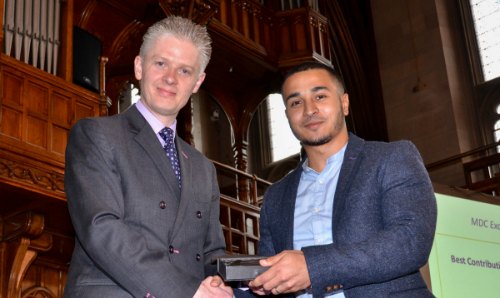Postgraduate Research Excellence Awards 2015
The outstanding performance of our postgraduate research students has been recognised in this year’s Manchester Doctoral College Excellence Awards.

The 2015 winners were chosen for their outstanding performance in the following categories:
Postgraduate research student of the year– recognises outstanding academic excellence. An award will be made to a student who has excelled in some significant manner during their programme.
Best outstanding output – recognises research outputs of the highest quality and acknowledges the continuing importance of high-quality research to the University.
Best contribution to postgraduate research environment – recognises outstanding achievement or contribution of an individual towards the postgraduate environment. The award is given to a student who has made a positive impact, demonstrated innovation and creativity in their actions, and been an inspirational role model to other students.
Best contribution to society – recognises the outstanding achievement or contribution of an individual who has offered time and energy to make a difference to the social and economic wellbeing of our communities.
Best contribution to internationalisation – awarded to a student who best encapsulates the spirit of internationalisation at Manchester.
This year’s winners are:
Distinguished achievement award – Postgraduate research student of the year
Antony Beddard (Faculty of Engineering and Physical Sciences)
Anthony’s research is in the field of next generation power systems technology: Voltage-Source High-Voltage DC converter transmission (VSC-HVDC). He has written a large number of high-quality conference and journal papers, and produced a patented invention that led to £800,000 in research funding. He has also made significant contributions to industry guidelines through work with the leading international industry body CIGRE (the International Council on Large Electric Systems).
Ignacio Pecino (Faculty of Humanities)
Ignacio presented – and subsequently published – papers at the International Computer Music Conference (ICMC) in 2013 and 2014, and was invited to present his work at the Centre for Art and Media (ZKM) in Karlsruhe, Germany, in December 2014. Through his spinout company, SonicMaps, he has commercialised highly successful apps for Locative Audio (GPS geolocation-based immersive audio experience).
Oliver Freeman (Faculty of Life Sciences)
Oliver’s PhD investigated diabetic neuropathy – a common secondary complication of diabetes. In 2014 he was awarded an MRC Centenary Early Career Fellowship Award to build on his research success. Oliver extends his passion for science research to public engagement and science communication - leading a ‘Pint of Science’ team; developing animations, and study day events. He regularly writes for science blogs, has published an article in the Biological Sciences Review, and was commended in the prestigious MRC Max Perutz Science Writing Awards for his article about ‘Why sugary nerves aren’t so sweet’.
Ben Brown (Faculty of Medical and Human Sciences)
Ben is a newly qualified GP studying part-time towards a PhD in Health Informatics. Ben has notable achievements including first author peer-reviewed publications, receiving an international prize in Health Informatics, and receiving a national award for Primary Care Informatics. In 2014 he was offered three Doctoral Fellowships from the top UK medical research funders: National Institute for Health Research, Medical Research Council, and Wellcome Trust.
Best outstanding output award
Naji Milad Bassil (Faculty of Engineering and Physical Sciences)
Naji has done some excellent work in the new and very high-impact area of microbial impact on radioactive waste disposal. The outstanding output for which he is nominated is his first article, Bassil et al. (2014), ‘Microbial degradation of isosaccharinic acid at high pH’ published in one of the highest impact factor journals in the fields of Ecology and Microbiology, the International Society of Microbial Ecology (ISME) Journal (impact factor 9.267, ranked 4/140 in Ecology and 9/119 in Microbiology).
Martin Araboleda (Faculty of Humanities)
Martin has had two research articles accepted for publication in two high-impact, international journals of considerable repute: one in Environment and Planning D: Society and Space (2013 Web of Science impact factor 1.729) and another in the International Journal of Urban and Regional Research (impact factor 1.625). A third article is currently with Antipode (impact factor 1.885), awaiting a final decision after a second round of peer review.
Nicole Gossan (Faculty of Life Sciences)
Nicole’s research outputs include three first authored papers, one being ‘Ageing and osteoarthritis: a circadian rhythm connection’ Biogerontology, 2014 Jul 31. She also authored a news article for Labnews – ‘Calling time on osteoarthritis’.
Rachel Jennings (Faculty of Medical and Human Sciences)
Rachel’s work was published as a full article in Diabetes, a top specialty journal (impact factor 8.3) and attracted an accompanying editorial highlight of her major findings. A recent international report in the national news on generating insulin-secreting beta cells from stem cells cited her work as the under-pinning knowledge of normal development.
Best contribution to postgraduate research environment
Laura Fenton (Faculty of Humanities)
Laura has made an outstanding contribution to the PhD environment in Sociology, establishing events and learning resources that have had great impact on the intellectual, pastoral, and training dimensions of postgraduate life. As student representative since 2013, her most recent achievement has been establishing a Peer Mentor scheme due to commence in September 2015.
Best contribution to society
Oluwagbemisola Oluleye (Faculty of Engineering and Physical Sciences)
Since 2009, Oluwagbemisola has volunteered for The Rising Youth, a church-based youth group. She has contributed to the wellbeing and development of over 60 teenagers through formal workshops and social activities. In this role, she considers the particular challenges and expectations of the young people, many of whom are first- or second-generation immigrants from Africa.
Best contribution to internationalisation
Anas Bataw (Faculty of Engineering and Physical Sciences)
Anas has played a vital role in building positive dialogues with key stakeholders at BUiD (The British University in Dubai) and its partners, applying his strong command of Arabic language and cultural awareness to good effect, demonstrating a level of diplomacy that is advanced for his years.
About Manchester Doctoral College
Manchester Doctoral College (MDC) has oversight of all doctoral training and researcher development across The University of Manchester.
